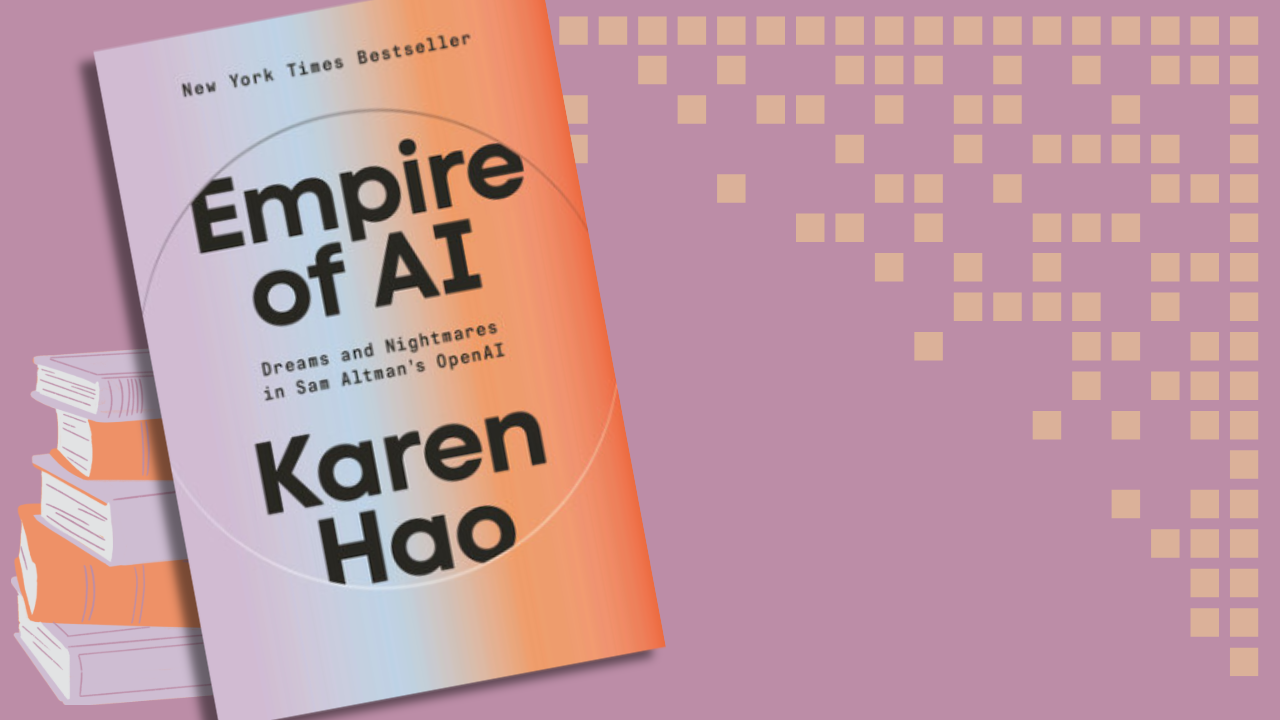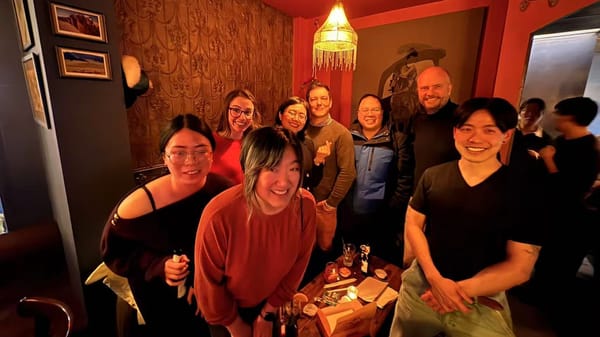10.22 | the empire of AI
What propelled me forward was Hao’s deeply humanist take on AI in general, and her ability to the entire American AI industry into a very historical, very societal, and very global context.

✉️ letter #69
I recently finished Karen Hao's Empire of AI and wow! I absolutely devoured it. It was truly a roller coaster ride of exasperation, amusement, indigence, and hope through every chapter, and I don’t think I’ve gone through a non-fiction book as fast I did hers in years.
I dived in already expecting the profile on OpenAI CEO Sam Altman, whom I know about enough to know generally about his staggering hubris, typical techbro hypocrisy and the deeply disturbing hijinks that would ensue from giving an overgrown child with super smarts and too much ambition a nearly limitless amount of money. But what propelled me forward was Hao’s deeply humanist take on AI in general, and her ability to the entire American AI industry into a very historical, very societal, and very global context.
🎼 the soundtrack | 22nd Century - Nina Simone
For me, it was interesting to see how many stark parallels there were between how Big AI has become a colonizing force and what we discuss when we talk about climate justice in the era of late-stage capitalism.
- It’s the relentless resource extraction diffused across so many industries as to seem ubiquitous and natural.
- It’s the "effective altruism" talk about how growth and progress is beautiful, while hiding massive exploitation and systemic injustices just below the surface.
- Especially looking at America, it's the scapegoat of our "race with China" as an excuse to skirt regulations meant to protect our own citizens. How do we compete unless we act worse than them? Never mind that despite tossing our stated values aside for the past four decades, they’ve somehow managed to keep pace with us.
- And it's Indigenous and POC communities who are pointing out that it doesn't have to be this way, who are actually leading the creation of AI systems that provide great societal value with clear guidelines on cultural ownership.
It turns out that we can have the future promised by AI — that it can handle the drudgery of collation so that we can focus on creativity, that it can direct us to technical solutions to help us save social and natural ecosystems — without the ick of losing our humanity to corporate capture.
Only, it requires holding very rich and powerful people accountable for tools they have the potential to control and make tons of money on. And you can only hold those guys accountable if the public 1) knows what’s actually going on, and 2) cares more about holding them accountable than you do about making pastiche Studio Ghibli-esque portraits of yourself.
Empire of AI helps a ton with 1, though I’m not really sure what we can do about 2.
There were numerous passages worth quoting from throughout the whole book, but I think this early one, which discusses MIT economists Acemoglu and Johnson’s ideas on technological revolutions, frames a lot of what comes after and encapsulates the fire Hao brings to the conversation:
“After analyzing one thousands years of technology history, the authors conclude that technologies are not inevitable. The ability to advance them is driven by a collective belief that they are worth advancing. The irony is that for this very reason, new technologies rarely default to bringing widespread prosperity, he authors continue. Those who successfully rally for a technology’s creation are those who have the power and resources to do the rallying. As they turn their ideas into reality, the vision they impose — of what the technology is and whom it can benefit — is thus the vision of a narrow elite, imbued with all their blind spots and self-serving philosophies. Only through cataclysmic shifts in society or powerful organized resistance can a technology transform from enriching the few to lifting the many.
The authors point to the invention of a new cotton gin in the 1790s as an example. The machine turned the American South into the largest global exporter of cotton, boosted the country’s top-line economic growth, and generated windfall returns for many landowners and cotton-related businesses. But it only served to intensify slavery and its horrific system of dehumanization and labor exploitation until its abolition seven decades later. With the surge in cotton production, Black people were forced to work longer hours and physically coerced by even harsher means to squeeze out every ounce of their labor. All the while, those who profited from the cotton gin painted the invention as one that made the enslaved happier. “I say it boldly, there is not a happier, more contented race upon the face of the earth,” said one South Carolina congressman.
These two features of technology revolutions — their promise to deliver progress and their tendency instead to reverse it for people out of power, especially the most vulnerable— are perhaps truer than ever for the moment we now find ourselves in with artificial intelligence. Since its conception, the development and use of AI has been propelled by tantalizing dreams of modernity and shaped by a narrow elite with the money and influence to bring forth their conception of the technology. That conception is what has led to the exploding social, labor, and environmental costs that are playing around the world today…
And yet, just like the South Carolina congressman, Silicon Valley has painted the experiences of those being exploited and harmed by the technology as happier because of it.”
In 2016, I read Cathy O'Neil's Weapons of Math Destruction, which pretty presciently detailed how unchecked algorithms could dismantle society and make us all pretty miserable. As the modern AI industry came into being, I've watched uneasily from the sidelines as many of her predictions played out.
Hao's book is both a spiritual successor and an expansion, a tech thriller by way of Sirkian melodrama and yet a surprisingly grounded path forward. I can’t recommend it enough.
🪢related threads
- In the vein of how the billionaire class is constantly saying different things about AI than just about anyone else, here’s the view of the actual worker bees in the industry: “Technologies like LLMs have utility, but the absurd way they've been over-hyped, the fact they're being forced on everyone, and the insistence on ignoring the many valid critiques about them make it very difficult to focus on legitimate uses where they might add value.” [Anil Dash]
- MIT holds AI expert panels on a pretty regular basis, and almost all of them agreed that the companies creating LLMs and generative AI can and should be held accountable. [MIT Sloan]
- And there are people out there that are working towards holding Big AI accountable, including the Algorithmic Justice League and OG digital rights protectors, the Electronic Frontier Foundation.
- If you want to be part of civil society shaping the future of AI, there’s now a $500 million commitment towards mobilizing that kind of work. “As part of Humanity AI, ten of the nation’s most dynamic foundations supporting the arts, labor and work, democracy, education, and security will drive new investments toward establishing an AI future where people and communities can flourish.” [Omidyar Network]
- And I want to be clear that I’m not actually against AI, I just want the technologies to be, as Anil Dash put it, focused on “legitimate uses where they might add value.” Some of the more legitimate uses can be found in the UK’s National AI Awards, which showcases the ways AI can improve life when it’s not, say, being used to generate brainrot short vids or porn. Sigh. [The National AI Awards].
✨enjoying: a piece of pop culture fun
If I'm going to have to interact with the products of corporate tech overlords, I would like them to be like Murderbot. Completely uninterested in my problems, yet with a vague sense of responsibility. Mostly content to stand around and watch space soap operas until needed.
I'm notorious for dropping shows (or at least telling myself I'll finish them one day, when I'm more in the mood for them), but I anticipated every week of Murderbot. If you love sci-fi and satire with heart, you should check it out.
🗨️a final quote
I think the economic logic behind dumping a load of toxic waste in the lowest-wage country is impeccable and we should face up to that. . . . I’ve always thought that countries in Africa are vastly under polluted; their air quality is probably vastly inefficiently low compared to Los Angeles. . . . Just between you and me, shouldn’t the World Bank be encouraging more migration of the dirty industries to the Least Developed Countries?
-- Lawrence Summers, confidential World Bank memo, December 12, 1991
Stalk me on Social Media
Instagram | TikTok | LinkedIN | Twitter | Goodreads | Spotify




